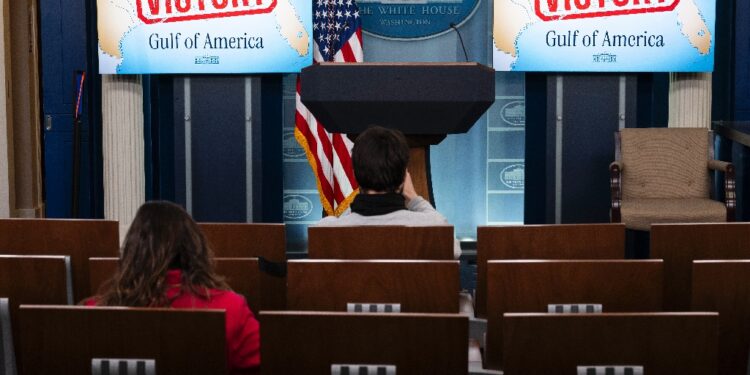(AFP) – A US judge on Monday declined to immediately order the White House to restore full access to President Donald Trump’s events to the Associated Press news agency. District Judge Trevor McFadden denied the AP’s emergency request but set a date next month for a more extensive hearing about the dispute.
The White House began blocking AP journalists from the Oval Office two weeks ago over the wire service’s decision to keep using “Gulf of Mexico,” despite a Trump executive order renaming the body of water as the “Gulf of America.” The AP, in a suit filed in Washington against three White House officials, said the move violates the First Amendment of the US Constitution, which guarantees freedom of speech and of the press. Lawyers for the White House rejected the argument, saying “the president has discretion to decide who will have special media access to exclusive events.”
McFadden, a Trump appointee, declined the AP’s request to issue a restraining order temporarily restoring AP’s access to all Trump events and scheduled a March 20 hearing to revisit the case. The judge also appeared skeptical about the ban, according to US press reports, calling it “problematic” and saying the White House may want to reconsider its position. The White House welcomed McFadden’s initial ruling. “As we have said from the beginning, asking the President of the United States questions in the Oval Office and aboard Air Force One is a privilege granted to journalists, not a legal right,” the White House said in a statement.
Lauren Easton, an AP spokesperson, said the agency looks forward to the next hearing “where we will continue to stand for the right of the press and the public to speak freely without government retaliation.” The White House initially blocked AP journalists from the Oval Office and later extended the ban to Air Force One, where the news agency has long had permanent seats.
White House chief of staff Susan Wiles, deputy chief of staff Taylor Budowich, and press secretary Karoline Leavitt were named as defendants in the AP suit. Their lawyers, in a motion filed with the court, said the case is not about prohibiting the AP from attending press briefings or using press facilities at the White House. “Instead, this case is about the Associated Press losing special media access to the President — a quintessentially discretionary presidential choice that infringes no constitutional right,” they said. “Most journalists have no routine access to the Oval Office, Air Force One, or the President’s home at Mar-a-Lago,” they added. “The President has discretion to decide who will have special media access to exclusive events.”
In its style guide, the AP noted that the Gulf of Mexico has “carried that name for more than 400 years” and said it “will refer to it by its original name while acknowledging the new name Trump has chosen.” “As a global news agency that disseminates news around the world, the AP must ensure that place names and geography are easily recognizable to all audiences,” it said. The 180-year-old AP has long been a pillar of US journalism and provides news to print, TV, and radio outlets across the United States and around the world.
© 2024 AFP











